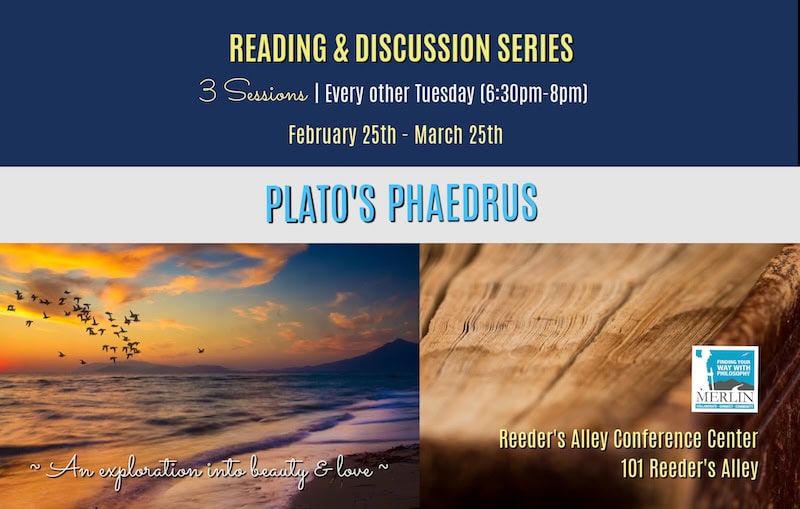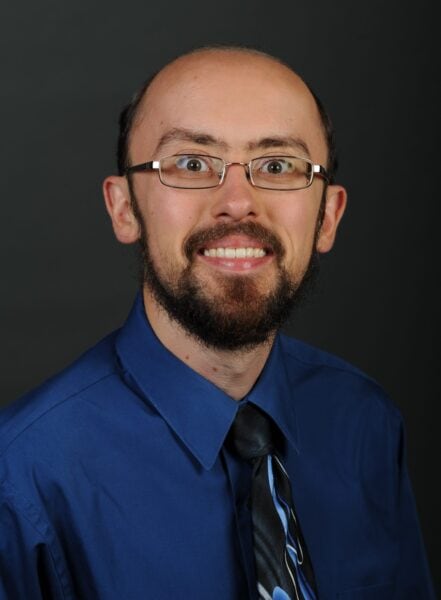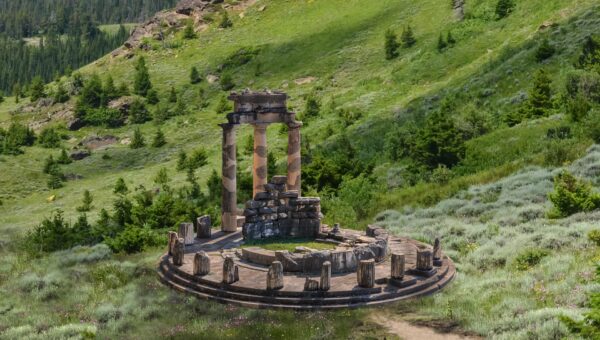
- This event has passed.
Reading & Discussion Series: Plato’s Phaedrus
March 11 @ 6:30 pm – 8:00 pm

What We’ll Explore
The Phaedrus is arguably the most beautiful of Plato’s dialogues. This comes as no surprise, since the subject of the dialogue is Beauty in all its varieties, at every level of the cosmos: from the nymph-haunted grove in which Socrates and Phaedrus have their conversation, to the beauty of human bodies (young Phaedrus was exceptionally handsome!), to the beauty of speech and discourse (both mythic and scientific), to the beauty proper to human souls (their knowledge and virtues), to the intelligible and divine beauty at the summit of all these.
In the course of this wide-ranging inquiry into beauty, many other specific themes and questions arise, notably:
- The issue of madness, insanity, or mania. Is madness — being outside our proper human rationality — always something that makes us in some way “less than fully human” in our behavior, or can some kinds of madness actually be elevating, helping us to live and act in ways that exceed our proper human nature, and share in a divine life?
- Speech and writing. What necessary roles to orality (spoken speech) and memory have? How does the process of writing contribute to, or detract from, our capacities for learning and discourse?
- And of course, love. No treatment of beauty could possibly be complete without considering the activity of love, which draws us toward to what we perceive to be beautiful. How can love for another person, if done well, make an essential contribution to our flourishing in this life and beyond — as Socrates puts it, to the unfolding of the wings of the soul, and her taking flight?
While each session will be self-contained (such that you can attend a stand-alone session and still benefit), participating in as many sessions as possible will allow more time to make and experience larger connections between readings, ideas, and questions explored.
FREE & open to the public. Donations appreciated.
When Every Other Tuesday (3 sessions total) February 25th - March 25th, 2025 6:30pm - 8pm Where Reeder's Alley Conference Center (101 Reeder's Alley) RSVP Sign up here! (Seats limited) Cost
FREE (Donations appreciated for series facilitation). $10 for the series book.
Book Information
We'll be using a new paperback edition of Plato's dialogue, published by the Prometheus Trust in January 2025. Books are available for our group at a special discounted price of $10 each, payable by cash or check (to Merlin CCC). If that would be a barrier to participating, we also have a small number of copies that have been provided by an anonymous donor, that will be available at no cost. If you need one of these, just reach out and let us know, no questions asked.
How/where to get your copy of the book
You have two ways to pick-up your book before our first series session!
(1) Books will be available in the Visit Helena office located at the bottom of Reeder's Alley starting the 1st of February. Ask Jazlyn (at the front desk) for a copy.
(2) You can also e-mail our workshop facilitator at [email protected] to make arrangements.
Sessions Reading Structure
While it’s certainly helpful to bear in mind the entire arc of the dialogue, we’ll focus our conversation on roughly one-third of the text (about 20 pages of Plato) in each session. (A detailed pdf of the reading plan can be viewed and downloaded below). Some of the main themes for each evening’s discussion will include:
WEEK 1 (February 25th)
- The setting, characters, and theme of the dialogue as a whole.
- The first two speeches concerning love, each of which suggest that it might be better to gratify someone who does not love us, rather than someone who does, on account of the madness that love entails. Though Socrates will ultimately go on to recant much of this, these speeches nonetheless point to some things which are true, even if incomplete.
WEEK 2 (March 11th)
- Divinely-inspired love, and the divine madness that places us above the merely rational. As preparation for this, we get Plato’s most definitive and complete argument of the immortality of the soul: a single paragraph that we’ll spend a good deal of our time working to unpack and interpret together.
- We’ll also follow Socrates and Phaedrus in their magnificent vision of our souls circling the heavens, following the Gods in viewing the intelligible forms of Beauty, Justice, and the like.
WEEK 3 (March 25th)
- Now, we’re descending back down from the sweeping vision of the third speech on love. This will include some examination of the beauty of souls, of discourse, and of the grove itself, thus uniting the end back to the beginning. Here too, we find Socrates’ famous (or infamous) critique of writing which, far from being an “all or nothing” type of argument, can offer us as starting point for classifying the purposes and appropriate methods of different types of discourse.
Reading & Discussion Plan (View & Download PDF)

Series Reading Material Information
In order to keep our group literally on the same page, we'll be using a new paperback edition of Plato's dialogue, published by the Prometheus Trust in January 2025. This includes a translation of the Phaedrus (which we'll be reading all of, divided across our three sessions), plus six introductory essays by Tim Addey and our workshop facilitator, David Nowakowski, that will offer some additional context and guidance to those interested in deepening their study (not required for our sessions, but they will be recommended as supplements at various points). In addition to providing those essays, if we're all working from the same edition, it will make it easy for us to read sections of the dialogue aloud together during our evening sessions, with everyone working from the same translation and the same page numbers, so we can easily find our place and stay together.
Preparation for Series
It's important that everyone in our group get a copy of the book in advance of the first session, so we can read at least the first sections of the dialogue prior to that session and be ready to discuss them with the group.
Series Facilitator

David Nowakowski is a philosopher and educator in the Helena area whose professional work is dedicated to helping people of all ages and backgrounds access, understand, and apply the traditions of ancient philosophy to their own lives. David began studying ancient philosophies and classical languages in 2001, and has continued ever since. A scholar of the philosophical traditions of the ancient Mediterranean (Greece, Rome, and North Africa) and of the Indian subcontinent, reading Sanskrit, Latin, and classical Greek, he earned his Ph.D. in philosophy from Princeton University in 2014. His work has appeared in a variety of scholarly journals, including Philosophy East & West, Asian Philosophy, and the Journal of Indian Philosophy, as well as in presentations to academic audiences at Harvard, Columbia University, the University of Toronto, Yale-NUS College in Singapore, and elsewhere.
After half a decade teaching at liberal arts colleges in the northeast, David chose to leave the academy in order to focus his energies on the transformative value of these ancient philosophical and spiritual traditions in his own life and practice, and on building new systems of education and community learning that will make this rich heritage alive and available to others.
A hermit by nature and by committed choice, he balances contemplative solitude with his active work in teaching, counseling, and the healing arts. David can be reached at [email protected] or via his personal website.
Make a Donation Here

Our philosophy activities are FREE to the community. While donations are never expected, they are always appreciated and help to keep programs like these going. Donations help to cover activity leader honorariums, implementation, and resource archiving, and more! If you would like to make a tax-deductible contribution you can do so by clicking here. For those facing more challenging financial circumstances, we ask that you please try to “pay it forward” with acts of kindness for your neighbors and community.
